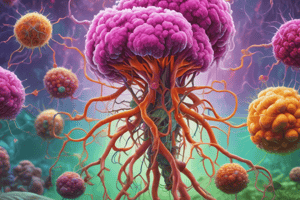Podcast
Questions and Answers
What is NOT a sign of inflammation?
What is NOT a sign of inflammation?
- Swelling
- Nausea (correct)
- Redness
- Heat
Which type of immunity is acquired deliberately through exposure?
Which type of immunity is acquired deliberately through exposure?
- Inherited immunity
- Natural immunity
- Active immunity (correct)
- Passive immunity
What role do antibodies play in the immune response?
What role do antibodies play in the immune response?
- They form complexes with antigens to neutralize toxins. (correct)
- They increase blood flow to inflamed areas.
- They destroy harmful substances directly.
- They act as antigen-presenting cells.
Which cells are primarily responsible for humoral immunity?
Which cells are primarily responsible for humoral immunity?
Delayed allergic responses primarily involve which type of immunity?
Delayed allergic responses primarily involve which type of immunity?
Complement proteins primarily enhance the action of which components in the immune response?
Complement proteins primarily enhance the action of which components in the immune response?
What is an important function of lymph nodes in the lymphatic system?
What is an important function of lymph nodes in the lymphatic system?
Which types of T cells have specific functions related to the immune response?
Which types of T cells have specific functions related to the immune response?
What is the role of lymphatic capillaries?
What is the role of lymphatic capillaries?
What is one of the primary functions of lymph nodes?
What is one of the primary functions of lymph nodes?
What is the primary function of the thymus?
What is the primary function of the thymus?
What condition can indicate lymphadenitis?
What condition can indicate lymphadenitis?
What is the largest lymphoid organ in the body?
What is the largest lymphoid organ in the body?
What happens to the thymus during childhood?
What happens to the thymus during childhood?
What can chronic infections of the tonsils impair?
What can chronic infections of the tonsils impair?
What is splenomegaly?
What is splenomegaly?
Flashcards are hidden until you start studying
Study Notes
Lymphatic System Overview
- Lymphatic vessels ensure one-way movement of lymph, critical for fluid balance.
- Lymphatic capillaries are small, blind-ended tubes with porous walls, also called lacteals in the intestines for fat transport to the bloodstream.
- These capillaries consist of a single layer of simple squamous epithelium and are vital for returning proteins and substances to the blood.
Lymph Nodes
- Situated in clusters along lymphatic pathways, lymph nodes filter lymph and are essential for immune function.
- Composed of lymphoid tissue, containing lymphocytes, which help in white blood cell formation and immune defense.
- Swollen and tender lymph nodes may indicate lymphadenitis, signaling infection or disease.
Thymus
- Located in the mediastinum, the thymus plays a critical role in the immune system by producing T lymphocytes (T cells) and secreting thymosins.
- During childhood, the thymus undergoes involution, replacing lymphoid tissue with fat, weighing around 35 to 40 grams.
- It is essential for T-cell development and effective immune responses.
Tonsils
- Comprise three masses of lymphoid tissue: palatine, pharyngeal (adenoids), and lingual tonsils, positioned around the mouth and throat.
- Serve important immune functions but can become chronically infected, leading to enlargement and breathing difficulties.
Spleen
- The largest lymphoid organ, located in the upper left abdomen, functions in phagocytosis of bacteria and old red blood cells.
- Acts as a blood reservoir; surgical removal is known as splenectomy, while enlargement is termed splenomegaly.
- Its vulnerable position makes it prone to injury from abdominal trauma.
Immune System: Nonspecific Immunity
- Comprises physical barriers like skin and secretions such as tears and mucus that eliminate harmful agents.
- Inflammation is a critical response that draws immune cells to injured areas, characterized by heat, redness, pain, and swelling.
- Provides immediate defense against pathogens without prior exposure.
Immune System: Specific Immunity
- Known as adaptive immunity, it recognizes and remembers specific harmful substances.
- Inherited immunity offers protection at birth, while acquired immunity can be natural (from exposure) or artificial (via vaccination).
- Active immunity arises from infections or vaccinations, while passive immunity transfers from mother to child or via vaccines.
Immune System Molecules
- Antibodies are proteins with specific sites for antigens, neutralizing toxins and facilitating phagocytosis.
- Antigen-antibody complexes play a crucial role in immune responses, while complement proteins enhance antibody action.
- The complement cascade triggers reactions forming holes in foreign cell membranes, aiding in immune defense.
Immune System Cells
- Phagocytes, including neutrophils, monocytes, and dendritic cells, ingest and destroy pathogens.
- Macrophages and dendritic cells present antigens, initiating immune responses.
- Lymphocytes, notably B cells and T cells, are crucial for adaptive immunity, where B cells provide humoral immunity and T cells offer cell-mediated immunity.
- Various T cell types (cytotoxic, helper, regulatory) serve distinct immune functions.
Hypersensitivity of the Immune System
- Hypersensitivity leads to excessive immune reactions, often resulting in allergies.
- Immediate allergic responses are linked to humoral immunity, while delayed responses involve cell-mediated immunity.
- Understanding these reactions is vital for effective management of allergic conditions.
Studying That Suits You
Use AI to generate personalized quizzes and flashcards to suit your learning preferences.




